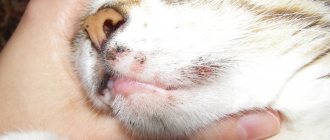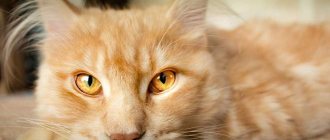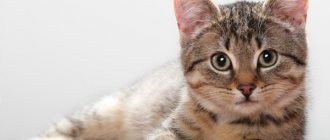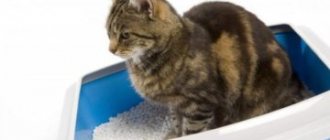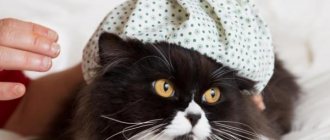Gastritis in cats is very rare. A person encounters this disease much more often, but suffers it in a milder form. It is more difficult for mustachioed pets to report their illness, so in most cases their owners notice alarming symptoms only at an advanced stage. At this point, an extensive ulcer develops in the body, affecting the deep layers of the mucosa.
What is gastritis and what can it be confused with?
The pathology is an inflammation of the gastric mucosa, accompanied by a deterioration in cell regeneration and the proliferation of fibrous tissue. All this leads to disruption of excretory function.
The acidity of gastric juice deviates from the norm, up or down. In the first case, there is an increased risk of the formation of erosions and ulcers, and in the second - intoxication of the body against the background of rotting food stuck on the way to the intestines as a result of weakened motility.
The disease can be confused with its complication - an ulcer. Both pathologies are characterized by severe pain. But with ulcers, they appear almost immediately after feeding, often occur at night and worsen in the autumn-spring period.
Reasons for the development of the disease
The causes of gastritis in cats are primary and secondary. In the first case, inflammation develops under the influence of external factors, and in the second, it acts as a complication of systemic pathologies.
External factors
Most external factors are associated with poor nutrition. Typical mistakes on the part of owners include:
- The temperature of the food being served is too high or low. Hot and cold pieces irritate the delicate mucous membrane. The condition is aggravated by rapid ingestion of food.
- Overfeeding. Failure to comply with the norms is fraught not only with obesity, but also with digestive disorders. The incoming volume of food does not have time to be digested by gastric juice, so the walls of the stomach stretch to store it.
- A sharp change in the usual menu. The transition to dry food and lower-class natural products is particularly difficult.
- Feeding food from the human table. Most of the foods we are familiar with are unacceptable for a cat's stomach, as they contain too many spices and additives. It is also not recommended to give your pet sharp bones and fish scales - they can cause mechanical injuries.
- Rarely changing water and neglecting its filtration. This is fraught with the consumption of harmful impurities and a high probability of infection by pathogenic microorganisms.
In addition to an incorrect diet, the inflammatory process can be caused by infections, helminthiases, poisoning and chronic stress. The disease can also be caused by long-term use of NSAIDs (anti-inflammatory drugs) and glucocorticosteroids. These drugs inhibit the synthesis of prostaglandins - special substances that protect the mucous membrane from the aggressive effects of gastric juice.
Internal factors
If inflammation develops against the background of another disease, then treatment will be ineffective until the root cause is eliminated. The most common systemic pathologies include:
- hormonal disorders;
- dental diseases;
- allergic reactions to food and medications;
- chronic renal and liver failure;
- diseases of the endocrine, cardiovascular and genitourinary systems.
There is also a genetic predisposition in some breeds. Such animals are at risk.
Risk groups and breed disposition
Pets prone to obesity and decorative breeds are most often affected. These include munchkins with unnaturally short limbs, Scottish Folds, short-tailed bobtails and hairless sphinxes.
The age of the animal also plays a significant role. In most cases, the disease is diagnosed in elderly individuals with weakened immune systems.
Characteristic and uncharacteristic symptoms
The first alarming symptoms resemble a common cold or mild poisoning. A sick animal becomes lethargic and inactive. It tries to hide from people, as touching causes it pain. Because of this, good-natured pets show unusual aggression.
A sick cat eats very little or refuses feeding completely. Despite this, he can sit at his bowl for a long time, which indicates that his appetite remains intact. There is also increased thirst and a short-term rise in temperature.
After a few days, signs of gastritis in cats become more alarming. The existing symptoms are supplemented by:
- bilious or bloody vomiting, as well as regurgitation after each meal;
- significant loss of body weight;
- dulling of wool;
- diarrhea or constipation with pieces of undigested food in the excrement;
- putrid odor from the mouth and a grayish or whitish coating on the tongue;
- noticeable tension in the abdominal muscles and an acute reaction to touching the abdomen.
During acute attacks of pain, the animal spreads its front legs wide and lowers its head, maintaining this position for several minutes. If you notice at least one of the listed symptoms, your mustachioed pet should be taken to a veterinarian for examination as soon as possible.
Varieties of the disease
Symptoms and treatments for gastritis in cats depend on its type. The available types differ in the type of inflammation and secretion of gastric juice, the nature of tissue damage, the cause of occurrence and the form of development of the pathological process.
Classification by type
All the criteria discussed below are taken into account when making a diagnosis and drawing up a treatment plan. That is why you should not treat an animal on your own, based on the recommendations of friends and acquaintances.
By type of inflammation
In the presence of catarrhal, purulent or hemorrhagic fluid in the tissues and cavities of the body, the inflammatory process is classified as exudative. If, when the mucous membrane is damaged, cell death and extensive ulceration are noted, the disease is classified as an alternative type.
According to the type of gastric juice secretion
With low acidity, the variety is called hypoacid, and with increased acidity, it is called hyperacid. In rare cases, the secretion of gastric juice remains within normal limits. This type of pathology is called normicidal.
According to the nature of tissue damage
Only a limited area or the entire mucous membrane may be affected. The first type of disease is called focal, and the second is diffuse.
Due to the occurrence
Depending on the cause, there are 5 more types of pathology. These include:
- Endogenous
. Occurs when there is a deficiency of a number of microelements that impair the production of pepsin and hydrochloric acid.
- Hypoxemic
. Appears in cardiovascular pathologies accompanied by prolonged oxygen deprivation.
- Uremic
. Develops as a result of liver pathologies (ulcerative urolithiasis, pyelonephritis, chronic renal failure). As a result of protein metabolism disorders, the amount of urea increases sharply and irritates the mucous membrane.
- Eosinophilic
. It is diagnosed with an increased level of eosinophils - cells of the immune system, which is characteristic of allergies and parasitic infestations.
- Idiopathic
. It does not have an exact cause of origin, which complicates treatment and often leads to the development of ulcers.
It is also worth noting the lymphoplasmacytic appearance. It is less common than all the listed varieties and is classified as an autoimmune disorder. In this case, lymphocytes are responsible for irritation of the mucous membrane, attacking their own healthy cells.
Classification by shape
According to the form of development, gastritis in cats is divided into acute and chronic. In the first case, there is a rapid increase in pronounced symptoms, in the second - a sluggish course with a blurred clinical picture with periodic exacerbations.
Late detection of the acute form is fraught with its transition to chronic, which is very difficult to treat. For this reason, you should not rejoice at the attenuation of alarming symptoms. For real recovery, the pet requires mandatory medical care.
What are the prognosis for this disease?
In acute gastritis, the outcome is favorable if treatment is started in a timely manner. In the chronic form, the prognosis depends on the cause that provoked the disease. The uremic form is not treated, as it develops as a complication of chronic renal failure. Periodic therapy and diet make it easier and prolong the life of your pet.
If eosinophilic gastritis develops with the appearance of infiltrates on the walls of the stomach, then recovery in most cases does not occur. The progressive disease destroys cells and tissues of other organs. If treated persistently, remission can be achieved.
Carrying out diagnostics
Due to the similarity with a number of diseases, a mustachioed patient will have to undergo a number of mandatory studies to make a diagnosis. These include:
- biochemical tests of urine and blood, determining the presence of urolithiasis, chronic kidney and liver failure, as well as stomach acidity;
- endoscopy and biopsy of the stomach, assessing the condition of the mucous membrane and the amount of gastric juice;
- Ultrasound and x-rays that reveal abnormalities in the functioning of internal organs.
After receiving all the results, the doctor decides how to treat gastritis in a cat, starting from the root cause. Therapy is based on medication and nutritional changes.
Causes of gastritis in cats
The cause of gastritis in cats is most often due to dietary errors. Even at home, pets can eat the bones of fish or poultry, causing mechanical injuries to the mucous membrane. With free range, the opportunity to pick up leftover human food increases. But some owners deliberately feed their animals food that is unsuitable for them, offering products intended for people.
Eating disorders in cats that can lead to stomach inflammation include:
- Feeding poor quality food (expired, spoiled, made from inappropriate ingredients).
- Lack of regular meals: the cat or kitten is fed rarely and in large quantities. Physiologically, the animal is able to eat a small portion and must receive food several times a day.
- A sudden change in diet or brand of food. This puts stress on the digestive system. Kittens are especially sensitive to sudden changes in food.
- Eating foods intended for humans. Household dishes contain additives that are dangerous for cats (salt, spices, onions, etc.); you should not feed them to your pet.
- Gastritis can be a consequence of individual sensitivity to the ingredients of ready-made and high-quality food. When introducing a new food into the diet, it is advisable to conduct a test.
The cause of uremic gastritis is the accumulation of nitrogenous substances in the blood. When they are secreted by the mucous membranes and skin of a domestic predator, characteristic pathologies of various organs and systems are formed.
Basic principles of treatment
Treatment of gastritis in cats at home is possible only after the condition has stabilized. In severe cases of the disease, the mustachioed patient is left in the hospital for several days for infusion therapy (drips). After eliminating the vomiting attacks and restoring the water balance, the pet is returned to the owner.
Depending on the symptoms present, the following medications may be needed:
- antiemetics (Metoclopramide);
- antiulcer drugs (ranitidine, omeprazole), which reduce acidity levels;
- digestive enzymes (Trypsin, Mezim-Forte, Pepsin);
- antibiotics (Sinulox, Kefzol, Ampicillin);
- analgesics (Spazgan, Baralgin);
- antacids (Phosphalugel, Almagel), enveloping the irritated mucosa;
- glucocorticosteroids (Prednisolone), which relieve allergic reactions;
- vitamins and immunomodulators.
To protect nerve endings from irritating factors, it is recommended to drink decoctions of oak bark, St. John's wort, flax seeds and blueberries, which have an enveloping effect. Please note that turning to traditional medicine is allowed only as part of complex therapy and only as prescribed by a veterinarian.
Treatment of gastritis in cats
Gastritis is diagnosed based on a complaint from the animal owner. The owner must answer the doctor’s questions in detail; this will help correctly determine the type of disease. If necessary, the veterinarian will prescribe additional tests.
Diet for gastritis is the main method of therapy. If the cause of the disease is due to the owner’s negligence, then it will be necessary to exclude harmful foods from the cat’s diet. To feed a sick animal, it is better to use special medicated food for cats with gastritis (Hills, Purina, Royal Canin, etc.).
All medications must be prescribed by a veterinarian. Animals are not treated with drugs for humans, the only exceptions being antacids (Almagel, etc.). If the temperature rises, cats should not be given antipyretic medications.
The doctor may recommend the drugs Omeprazole, Ranitidine, etc. During acute inflammation, injections are prescribed so as not to further irritate the mucous membrane.
In uremic syndrome, treatment of gastritis is carried out in combination with the elimination of symptoms of urolithiasis. Taking measures on your own can only harm the cat.
Diet is the most important part of therapy
The pet will have to fast for 24 hours after diagnosis. The next day, he should be gradually transferred to a therapeutic diet or dry food designed specifically for cats with gastritis.
You need to feed often (3-5 times a day), but in small portions. All food should be ground and pureed to a puree state, and its temperature should be at room temperature. When dry feeding, the granules will have to be soaked in water, but you can simply use soft canned food from the medicinal line.
The list of permitted products is determined by acidity:
- increased
– boiled meat, slimy porridges, low-fat fish, potato and carrot juices;
- reduced
– fermented milk products, bean puree, eggs, light soups with fish or meat broth, beetroot and cabbage juices.
Handouts from the human table should be completely eliminated. It is also recommended to ensure sufficient quantity and purity of water.
Prognosis and complications
With timely treatment, the prognosis is favorable. Exceptions include lymphoplasmacytic, eosinophilic and uremic gastritis in cats.
The first 2 types often recur, and the 3rd type is incurable in the presence of chronic renal failure. Chronic gastritis is no less difficult to treat.
Despite this, even the onset of a prolonged remission will be successful. You should not refuse drug therapy, since an advanced pathological process can result in the development of ulcers, loss of teeth, deterioration of vision and hearing, excessive hair loss, intestinal obstruction and gastric hemorrhage.
Why it develops: reasons
If your stomach constantly hurts and your pet’s behavior changes, this may signal an inflammatory reaction in the internal organ. With gastritis, gastric juice is produced in insufficient or excessive quantities, which negatively affects digestive function. When food digestion is impaired, it settles on the walls of the organ, causing decay processes and intoxication of the entire body. Severe pain and other symptoms of gastritis pose a particular danger to kittens; the pathology can lead to their death. The following factors provoke the development of gastritis are identified:
- chronic renal failure (CRF) and other disorders of the paired organ;
- impaired diet and consumption of only one dry food;
- very hot or cold food;
- sudden changes in diet, intake, transition from regular food to food or change of food;
- helminth infection;
- getting a large amount of wool into the stomach and other organs of the gastrointestinal tract;
- severe manifestation of allergies;
- influence of stress factors;
- diseases of infectious and viral nature;
- deviations of the genitourinary system, due to which gastroduodenitis or uremic gastritis may occur;
- inflammation of the pancreas;
- liver dysfunction;
- taking certain medications for a long time;
- exposure to toxic and chemical compounds on the cat’s body.
